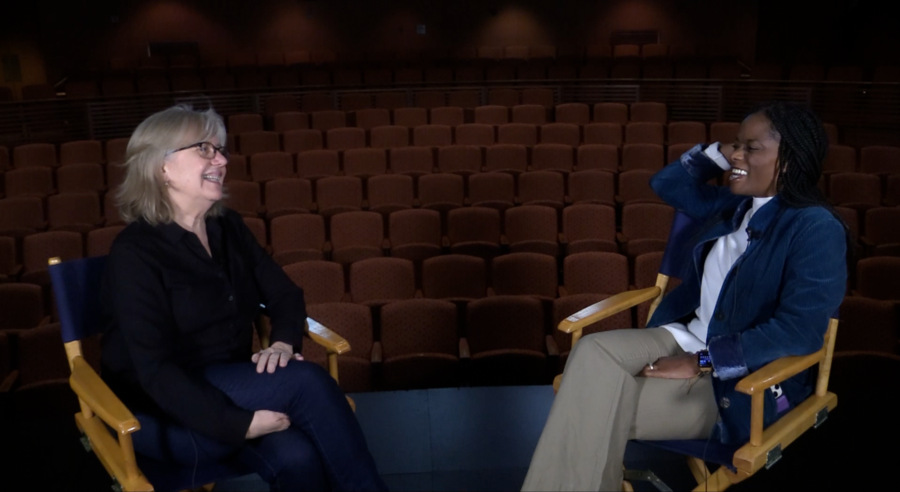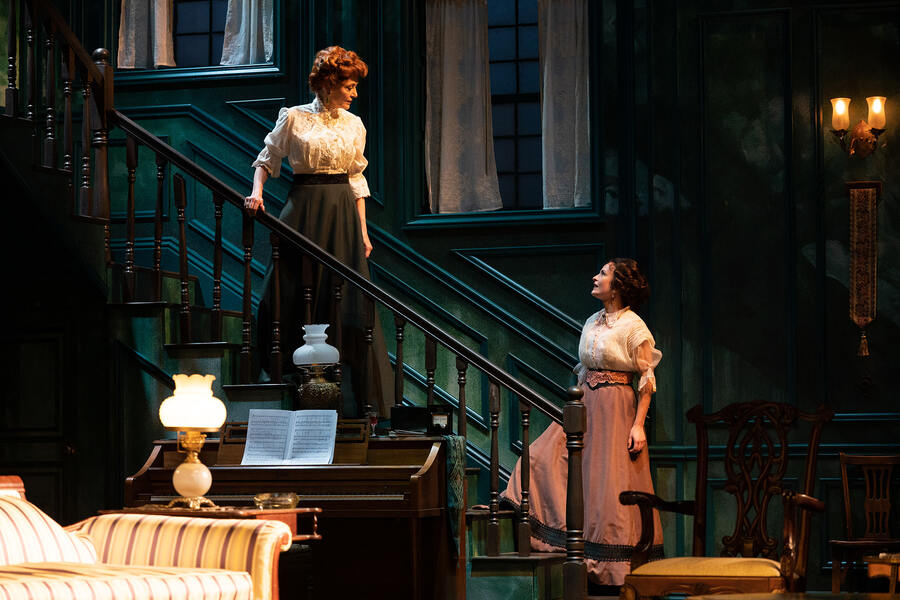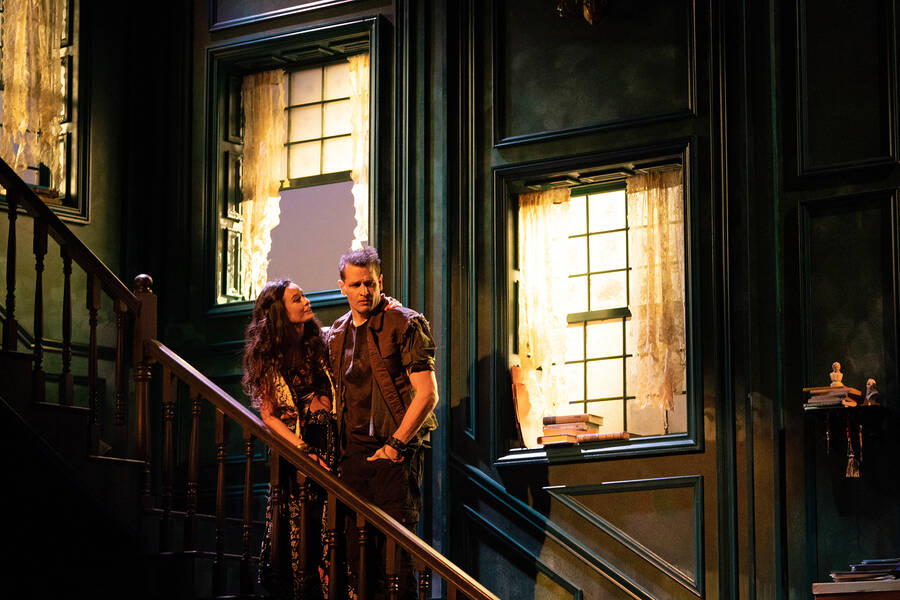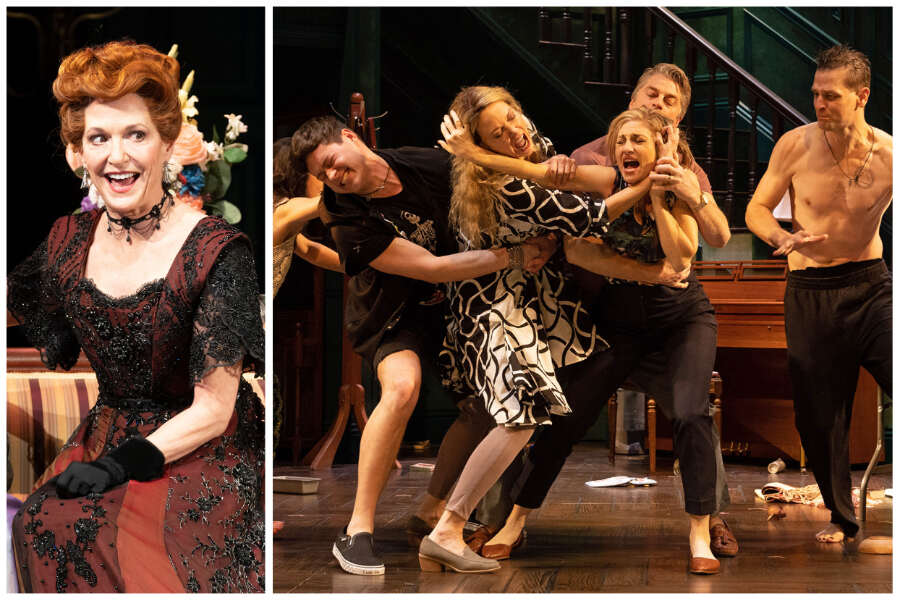Two households, both alike in venality: That could be the tagline for South Coast Repertory’s current “Voices of America” program, in which Lillian Hellman’s The Little Foxes trades off with Branden Jacobs-Jenkins’s Appropriate in rotating repertory. In two-show days and alternating evenings through Feb. 26, on the same basic set designed by Lawrence Moten, and with six of the same actors, Southern California audiences will have the chance not only to dig into two scintillating plays about families in conflict; they will also get the unique chance to contemplate the thematic resonances and rhymes between Hellman’s meaty 1939 drama of Southern plantation succession and Jacobs-Jenkins’s riotous, unsettling 2014 study of an estranged Arkansas family with a closetful of dark secrets.
“When I proposed it, everyone’s eyes kind of popped out,” said David Ivers, South Coast’s artistic director. Both plays had been on the reading list of the staff-wide “book club” Ivers has been running since he took the reins of the theatre in 2018, and the idea of pairing them arose in a convergence of realizations: that SCR had never produced a work by Hellman (“I was shocked, but that’s not an indictment—there are a lot of plays!”), and that Jacobs-Jenkins is under commission from the theatre, and Ivers had been looking for a way to introduce the writer to his audience before simply springing a new play on them.
“So I’m thinking, okay, one of them is set in Arkansas and one is set in Alabama,” Ivers recalled, “but they’re both on a plantation house in the South, they both center family, they center whiteness, one’s written by a luminary American woman and one by arguably one of the most talented current playwrights in the country.”
Still, doing both at once would be a stretch and a gamble. For one thing, though Orange County’s new-play powerhouse literally has “repertory” in its name, this is the first time the 59-year-old theatre has done true rotating repertory. For another, even theatres that do this regularly—mostly classics-oriented companies like American Shakespeare Center, A Noise Within, or the Shakespeare festivals in Utah and Oregon, where Ivers worked previously—don’t tend to program shows so, well, programmatically, in clear thematic tandem with each other. Sure, some Shakespeare theatres will do the Henriad (though often over a span of seasons, not all at once), and I can think of two other interesting examples, coincidentally both in Baltimore: Center Stage’s “The Raisin Cycle” in 2012, which paired two Hansberry-inspired plays, Kwame Kwei Armah’s Beneatha’s Place and Bruce Norris’s Clybourne Park, and Everyman’s “Great American Rep” in 2016, which put two postwar classics, Death of a Salesman and A Streetcar Named Desire, into the rep blender.
It would be a departure and a heavy lift for South Coast, surely. But, Ivers said, the more the idea developed, the more he and his team found it “undeniably compelling.” Conceded Ivers, “I wiped out a lot of other programming—which is not necessarily a virtue, it just means that it’s important to me—in order for us to make this one happen.”
While the design team and about half the actors are shared between the two plays, it was clear to Ivers that they would each benefit from having a separate director. So he brought in Delicia Turner Sonnenberg to helm Appropriate and Lisa Peterson to handle The Little Foxes, and the two directors have been sharing ideas and notes with each other about their respective productions, in a process Peterson calls “the grooviest” and about which Turner Sonnenberg raves simply, “I fucking love Lisa.”

Both said that while they are working to craft stand-alone stagings that can be viewed separately, they are also inevitably shaping their work with an eye to the comparisons and contrasts between the two plays and their perspectives. For her part, Peterson, who’s seen productions of Foxes she admired by Ivo van Hove and Daniel Sullivan, didn’t feel a burning need to put her own stamp on the play until the repertory offer arose.
“I only wanted to do it because it was going to be alongside Branden’s play,” she said. “The idea was that this is a lens through which we could look at certain notions about capitalism, and the way that the country is built on the slave economy.”
Meanwhile, Turner Sonnenberg noticed a line that Addie, the Black maid in The Little Foxes, has near the end, which the director feels links the two plays: “There are people who eat the earth and eat all the people on it…And other people who stand around and watch them eat.”
The eaters in Foxes are the Hubbards, a newly wealthy Southern family—arguably subtly coded as Jewish, as Hellman partly was—one of whom, Regina, has married into a fading but still flush plantation family, the Giddenses, and all of whom are scheming for money to fund a new cotton mill. In Appropriate, the Lafayettes descend on their late patriarch’s home to divvy up the inheritance, only to discover debts instead—not to mention troubling evidence that Dad was a hardcore anti-Black racist who collected lynching photos and may even have been a Klansman. In both plays, machinations and revelations churn up conflict over property, propriety, and privilege, as these two very different white families are confronted with their pasts in a violently unequal country and economy, and in turn struggle to map out their next steps. At the heart of both is a simple but freighted idea: what we take with us from one generation to the next.
“I describe it to the cast as a family coming home after the death of the patriarch to deal with their inheritance,” said Turner Sonnenberg. “A part of that inheritance is, yes, the house, but also the racism and the relics of it.”


In this unique repertory experiment, though, there’s another traffic or transference going on—not just among the parents and children within these plays, but between these two plays and their characters.
“I went into this somehow hoping that we would be looking for difference as much as possible—that for the actors the part in this play is wildly different from the part in that play, so that they have this range, so they don’t feel like they’re in the same trap,” said Peterson. “But as things are going on, I see: Oh, wow, there’s gonna be more and more similarities, not less. That’s gonna signify.”
Turner Sonnenberg likewise said she was “interested in how different the characters are in both plays. But I’ve been wondering if the work on Little Foxes is coloring the work in Appropriate. I was wondering in rehearsal the other day: Why is this getting so emotional in this moment that’s not really emotional?”
Shannon Cochran, who plays the lead in both plays—Toni Lafayette, the barely-holding-it-together oldest daughter in Appropriate, and Regina Giddens, the coolly Machiavellian widow-in-waiting of Foxes—has an inkling of what’s going on.
“I thought I would call characters by the wrong name, I thought I would get mixed up in my feelings, but none of that happened,” said Cochran, for whom repertory acting is a first but whose résumé is otherwise long; she previously appeared at SCR in A Doll’s House Part 2 and played Regina in a 2015 Goodman Theatre production of Foxes (for myself, I forever cherish her turn in Bug back in 2004). “I don’t know what kind of bifurcation my mind has been able to do, but there’s something exciting about getting through the day or the evening with one show—you get to let it percolate for a day, then switch gears and go to the other show.”
In that percolation, though, something is brewing.
“There’s some work that happens that you’re not aware of,” she said. “You could get all woo woo about it and say the characters are speaking to each other. I don’t know if that’s really true. But definitely something is rumbling or simmering on that burner while you’re doing the other piece.”
One name for that simmering something: a racial reckoning. Make no mistake; in neither play do the characters rudely awaken to their white privilege—indeed, if anything, by the end of their respective dramas, both the Hubbards and Lafayettes may in fact have doubled down on denial. Light bulbs should go off for audiences, though.
“There was a lot of deep and encouraging and hard conversation about what it means to put this many white people onstage right now,” said Ivers. The expectation is that in these “incredible fireworks theatrical experience from these really amazing playwrights,” South Coast’s predominantly white audience will “see themselves.”
Turner Sonnenberg put it more bluntly: “Racism is something that’s going to be solved by white people, necessarily. But when we think about it or how to solve it, we always turn to people of color. Really, it’s time for white people to start having these conversations with each other and themselves. I really hope this project is a way to at least start some of those conversations.”
Rob Weinert-Kendt (he/him) is the editor-in-chief of American Theatre. rwkendt@tcg.org


